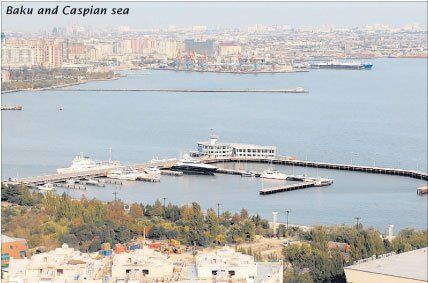Churches in Azerbaijan are facing increasing pressure due to government fears of religious extremism. A fact-finding trip by Release International discovered many churches are being denied official registration under tough new regulations.

But, despite the increasing pressures faced by Christians in the former Soviet republic, the church is growing.
Release, which serves persecuted Christians, has produced a DVD highlighting the challenge facing believers in Azerbaijan and featuring interviews with pastors and others. In the fire is available from the Release web site.
Oppression
Pastor ‘Izzat’ served 18 months behind bars after complaints by Muslim leaders. Thirty police and officials turned up at his house and warned him that it was illegal to spread the teachings of Jesus in Azerbaijan — even though freedom of religion is guaranteed under the constitution.
‘They openly told me, “If you stop acting as a Christian evangelist, we won’t put you in prison, but if you continue your activities as a Christian, we are going to accuse you of having illegal guns at your home”.’
Pastor Izzat replied that he would continue to do God’s work. He was taken to court and accused of keeping weapons. He told Release that the judges demanded bribes, which he refused to pay.
Having served his sentence, he has made the decision not to marry and have children — a sacrifice in a country where the family is foundational. He explained: ‘If I am imprisoned again, who is going to look after my wife and children?’
The pastor’s case highlights another dilemma facing Christians in Azerbaijan. Those who refuse to give or take bribes struggle to survive in a country where corruption is endemic. And that struggle is made harder because of the discrimination Christians face in employment.
‘However, the biggest obstacle facing churches in Azerbaijan today is registration’, says Release CEO Paul Robinson. ‘The Government is afraid of the spread of Islamic fundamentalism from over the border in Iran. Azerbaijan is clamping down on all religious organisations, including churches’.
In 2009, the law was amended to require religious organisations to register again with the authorities. In practice, applications for registration are often refused. As a result, even churches that had previously been granted registration are now considered illegal.
Registration
‘Asad’, a human rights lawyer, told Release: ‘One church has been in Azerbaijan for 150 years and has always had registration. Now, after the change to the Religion Law [in 2009], it’s almost impossible for them to get registered’.
In an eight-minute hearing at the Supreme Court, on 9 January 2013, Greater Grace Protestant Church, established for nearly 20 years, in Azerbaijan’s capital, Baku, lost its final appeal against liquidation. This means any further religious activity there is now illegal.
The judge threw out Greater Grace Church’s appeal against an earlier court order that it should be closed, claiming it had violated the 2009 Religion Law.
‘The new law of religious freedom [2009] is against the constitution’, said Pastor Iliya Zenchenko, head of the Baptist Union of Azerbaijan. ‘At any moment the pastor of a church can be imprisoned’.
Pastor Hamid described a police raid on his unregistered church. He told Release: ‘They confiscated all our literature and our Bibles. In the court the same guys said we found this pistol in the kitchen. They sentenced me to a year’s imprisonment.
‘It’s very hard to be in prison in Azerbaijan. It is very bad that the Government puts godly men into prison’.
The registration process is often mired in bureaucracy. Another church leader, ‘John’, showed Release the pile of papers involved in the unsuccessful registration bid by his church in 2006. They applied again, but had no response.
‘After a year, they said we had to change our bylaws’, he said. ‘So we changed the bylaws and resubmitted. Six years after our initial application, we are still waiting’.
Growth
John added: ‘If we don’t get registration, the police can fine the leader $1000. If this is not paid, the church leader can be sent to prison and have his apartment confiscated. The secret police said that, if we carried on, the fine would be doubled and then we would go to jail’.
And human rights lawyer Asad said the authorities had increased the fines significantly since 2009. $1000 is more than three times the average monthly wage in Azerbaijan.
Azerbaijan gained independence from the former Soviet Union in 1991. The oil-rich Islamic republic remains concerned about its two influential neighbours — Russia and Iran.
‘The Government is afraid of religious extremism’, explained Asad. ‘They are afraid that if people [become Christians], they would prefer the interests of Russia over those of Azerbaijan, while fundamentalist Muslims would prefer the interests of Iran’.
Yet, despite suspicion and official opposition, the church is steadily growing. In 1990, there were thought to be only 40 Azerbaijani evangelical Christians in the world, with very few inside the country. Today, there are an estimated 10,000 evangelicals in Azerbaijan.
‘Please pray for us. Pray for freedom, that believers can come together without being afraid of the Government, the police, security services or extremists’, one Christian asked Release.
‘Pray that Christians will be able to find work, as many are jobless, and pray too that there will be those who can represent and defend the rights of believers in Azerbaijan’.
Release gives practical assistance to persecuted Christians in Azerbaijan, by providing legal support for those in prison because of their faith in Jesus Christ.
www.releaseinternational.org




